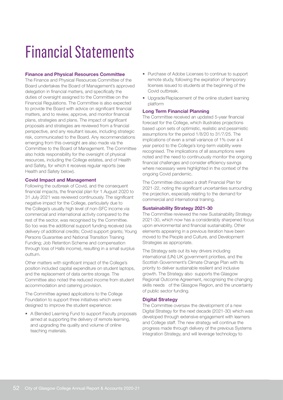
52 City of Glasgow College Annual Report & Accounts 2020-21
Financial Statements
Finance and Physical Resources Committee
The Finance and Physical Resources Committee of the
Board undertakes the Board of Management's approved
delegation in financial matters, and specifically the
duties of oversight assigned to the Committee on the
Financial Regulations. The Committee is also expected
to provide the Board with advice on significant financial
matters, and to review, approve, and monitor financial
plans, strategies and plans. The impact of significant
proposals and strategies are reviewed from a financial
perspective, and any resultant issues, including strategic
risk, communicated to the Board. Any recommendations
emerging from this oversight are also made via the
Committee to the Board of Management. The Committee
also holds responsibility for the oversight of physical
resources, including the College estates, and of Health
and Safety, for which it receives regular reports (see
Health and Safety below).
Covid Impact and Management
Following the outbreak of Covid, and the consequent
financial impacts, the financial plan for 1 August 2020 to
31 July 2021 was reviewed continuously. The significant
negative impact for the College, particularly due to
the College's usually high level of non-SFC income via
commercial and international activity compared to the
rest of the sector, was recognised by the Committee.
So too was the additional support funding received (via
delivery of additional credits; Covid support grants; Young
Persons Guarantee and National Transition Training
Funding; Job Retention Scheme and compensation
through loss of Halls income), resulting in a small surplus
outturn.
Other matters with significant impact of the College's
position included capital expenditure on student laptops,
and the replacement of data centre storage. The
Committee also noted the reduced income from student
accommodation and catering provision.
The Committee agreed applications to the College
Foundation to support three initiatives which were
designed to improve the student experience:
• A Blended Learning Fund to support Faculty proposals
aimed at supporting the delivery of remote learning,
and upgrading the quality and volume of online
teaching materials.
• Purchase of Adobe Licenses to continue to support
remote study, following the expiration of temporary
licenses issued to students at the beginning of the
Covid outbreak.
• Upgrade/Replacement of the online student learning
platform
Long Term Financial Planning
The Committee received an updated 5-year financial
forecast for the College, which illustrates projections
based upon sets of optimistic, realistic and pessimistic
assumptions for the period 1/8/20 to 31/7/25. The
implications of even a small variance of 1% over a 4
year period to the College's long-term viability were
recognised. The implications of all assumptions were
noted and the need to continuously monitor the ongoing
financial challenges and consider efficiency savings
where necessary were highlighted in the context of the
ongoing Covid pandemic.
The Committee discussed a draft Financial Plan for
2021-22, noting the significant uncertainties surrounding
the projection, especially relating to the demand for
commercial and international training.
Sustainability Strategy 2021-30
The Committee reviewed the new Sustainability Strategy
2021-30, which now has a considerably sharpened focus
upon environmental and financial sustainability. Other
elements appearing in a previous iteration have been
moved to the People and Culture, and Development
Strategies as appropriate.
The Strategy sets out its key drivers including
international (UN) UK government priorities, and the
Scottish Government's Climate Change Plan with its
priority to deliver sustainable resilient and inclusive
growth. The Strategy also supports the Glasgow
Regional Outcome Agreement, recognising the changing
skills needs of the Glasgow Region, and the uncertainty
of public sector funding.
Digital Strategy
The Committee oversaw the development of a new
Digital Strategy for the next decade (2021-30) which was
developed through extensive engagement with learners
and College staff. The new strategy will continue the
progress made through delivery of the previous Systems
Integration Strategy, and will leverage technology to